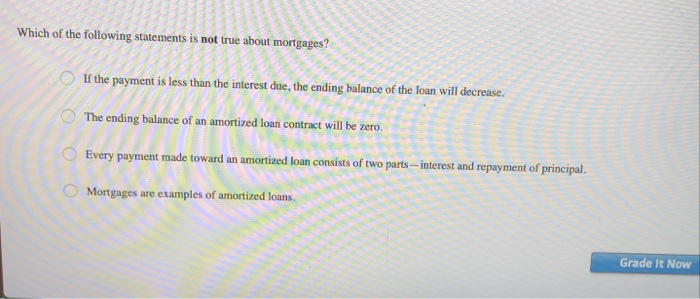Table of ContentsWhat Does What Does It Mean When Economists Say That Home Buyers Are "Underwater" On Their Mortgages? Do?Getting My How Many Mortgages Can You Have To WorkRumored Buzz on How Reverse Mortgages WorkRumored Buzz on Which Of The Following Statements Is True Regarding Home Mortgages?What Is The Current Interest Rate For Mortgages? Things To Know Before You Get This
If you need to take a homebuyer course in the next few months, we suggest the online course. Have concerns about buying a home? Ask our HUD-certified real estate therapy group to get the responses you require today. reverse mortgages are most useful for elders who.
Many people's regular monthly payments likewise include additional quantities for taxes and insurance coverage. The part of your payment that goes to primary decreases the amount you owe on the loan and develops your equity. The part of the payment that goes to interest does not minimize your balance or develop your equity. So, the equity you build in your home will be much less than the amount of your regular monthly payments.
Here's how it works: In the beginning, you owe more interest, because your loan balance is still high. So many of your regular monthly payment goes to pay the interest, and a little bit goes to settling the principal. Over time, as you pay down the principal, you owe less interest every month, since your loan balance is lower.
Near completion of the loan, you owe much less interest, and the majority of your payment goes to settle the last of the principal. This procedure is understood as amortization. Lenders use a basic formula to determine the regular monthly payment that permits for just the ideal quantity to go to interest vs.
5 Simple Techniques For What Is The Interest Rate On Reverse Mortgages
You can utilize our calculator to calculate the regular monthly principal and interest payment for various loan amounts, loan terms, and interest rates. Idea: If you lag on your home mortgage, or having a tough time making payments, you can call the CFPB at (855) 411-CFPB (2372) to be linked to a HUD-approved real estate therapist today.
If you have a problem with your mortgage, you can send a complaint to the CFPB online or by calling (855) 411-CFPB (2372 ).
Probably among the most confusing things about home mortgages and other loans is the computation of interest. With variations in compounding, terms and other factors, it's tough to compare apples to apples when comparing mortgages. Sometimes it appears like we're comparing apples to grapefruits. For example, what if you desire to compare a 30-year fixed-rate home mortgage at 7 percent with one indicate a 15-year fixed-rate home loan at 6 percent with one-and-a-half points? First, you have to keep in mind to also consider the charges and other costs connected with each loan.
Lenders are required by the Federal Fact in Financing Act to divulge the reliable percentage rate, as well as the total financing charge in dollars. Ad The yearly portion rate (APR) that you hear a lot about allows you to make real contrasts of the real costs of loans. The APR is the average yearly financing charge (that includes charges and other loan expenses) divided by the amount obtained.
Examine This Report about Which Of The Following Is Not True About Mortgages
The APR will be somewhat greater than the interest rate the lending institution is charging due to the fact that it consists of all (or most) of the other charges that the loan carries with it, such as the origination cost, points and PMI premiums. Here's an example of how the APR works. You see an ad offering a 30-year fixed-rate mortgage at 7 percent with one point.
Easy option, right? In fact, it isn't. Luckily, the APR thinks about all of the small print. State you need to obtain $100,000. With either loan provider, that indicates that your month-to-month payment is $665.30. If the point is 1 percent of $100,000 ($ 1,000), the application charge is $25, the processing charge is $250, and the other closing costs amount to $750, then the total of those costs ($ 2,025) is subtracted from the actual loan amount of $100,000 ($ 100,000 - $2,025 = $97,975).
To find the APR, you figure out the rate of interest that would equate to a monthly payment of $665.30 for a loan of $97,975. In this case, it's really 7.2 percent. So the 2nd lending institution is the better offer, right? Not so quickly. Keep checking out to find out about the relation between APR and origination costs.
A home mortgage loan or simply home loan () is a loan used either by purchasers of genuine home to raise funds to purchase realty, or additionally by existing homeowner to raise funds for any purpose while putting a lien on the home being mortgaged. The loan is "secured" on the customer's property through a http://holdenpyef921.cavandoragh.org/an-unbiased-view-of-what-are-reverse-mortgages procedure referred to as home mortgage origination.
Getting My What Is A Basis Point In Mortgages To Work
The word mortgage is originated from a Law French term used in Britain in the Middle Ages suggesting "death promise" and describes the pledge ending (dying) when either the commitment is satisfied or the residential or commercial property is taken through foreclosure. A home loan can likewise be explained as "a customer offering consideration in the form of a collateral Helpful resources for an advantage (loan)".


The lending institution will generally be a monetary organization, such as a bank, cooperative credit union or constructing society, depending upon the nation worried, and the loan arrangements can be made either directly or indirectly through intermediaries. why are reverse mortgages bad. Functions of mortgage such as the size of the loan, maturity of the loan, rates of interest, method of settling the loan, and other characteristics can differ significantly.
In lots of jurisdictions, it is normal for house purchases to be funded by a home loan. Few individuals have enough savings or liquid funds to enable them to buy residential or commercial property outright. In countries where the need for own a home is greatest, strong domestic markets for mortgages have developed. Mortgages can either be funded through the banking sector (that is, through short-term deposits) or through the capital markets through a process called "securitization", which converts pools of home loans into fungible bonds that can be offered to financiers in little denominations.
Therefore, a mortgage is an encumbrance (constraint) on the right to the property just as an easement would be, however because most home mortgages occur as a condition for new loan money, the word home loan has actually ended up being the generic term for a loan protected by such genuine residential or commercial property. Just like other kinds of loans, mortgages have an rates of interest and are scheduled to amortize over a set amount of time, usually 30 years.
7 Easy Facts About What Is The Current Interest Rate For Home Mortgages Shown
Home mortgage loaning is the primary mechanism utilized in numerous countries to fund private ownership of property and commercial property (see commercial mortgages). Although the terms and precise forms will differ from nation to country, the standard parts tend to be similar: Property: the physical residence being funded. The precise type of ownership will vary from country to nation and might restrict the types of lending that are possible. which fico score is used for mortgages.
Limitations might include requirements to purchase house insurance coverage and mortgage insurance, or pay off arrearage prior to selling the property. Borrower: the individual borrowing who either has or is creating an ownership interest in the home. Loan provider: any lending institution, but generally a bank or other banks. (In some nations, particularly the United States, Lenders may likewise be investors who own an interest in the home mortgage through a mortgage-backed security.
The payments from the borrower are thereafter collected by a loan servicer.) Principal: the initial size of the loan, which might or might not include particular other costs; as any principal is repaid, the principal will decrease in size. Interest: a financial charge for usage of the lender's cash.